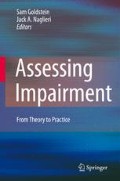Abstract
In Western medicine, the medical model guides diagnosis and treatment in all aspects of medicine and mental health. The purpose is to identify treatments for diagnoses based on evidence of specific symptoms assumed to suggest problems inherent within one or more organs of the human body. The medical model has driven research and theory about physical and mental health problems on the basis of causation, symptom relief, and cure and in some cases has been quite successful (e.g., tuberculosis, measles, etc.). As the fields of medicine and psychology have evolved, interest in the degree of impairment, regardless of the diagnosis, has increased.
Access this chapter
Tax calculation will be finalised at checkout
Purchases are for personal use only
References
American Association on Intellectual and Developmental Disabilities. (2008) http://www.aamr.org/Policies/faq_mental_retardation.shtml
American Psychiatric Association. (2000). Diagnostic and statistical manual of mental disorders (4th ed., text revision). Washington, DC: Author.
Barkley, R. A., Cunningham, C. E., Gordon, M., Faraone, S. V., Lewandowski, L., & Murphy, K. R. (2006). ADHD symptoms vs. impairment: Revisited. The ADHD Report, 14, 1–9.
Bird, H. R., Andrews, H., Schwab-Stone, M., Goodman, S., Dulcan, M., Richters, J., et al. (1996). Global measures of impairment for epidemiological and clinical use with children and adolescents. International Journal of Methods in Psychiatric Research, 6, 295–307.
Brigham, C., Uejao, C., Dillback, J., & Walker, P. (2006). Errors in impairment rating: Challenges and opportunities. Journal of workers compensation 15(4), 19–42.
Castle, L., Aubert, R. R., Verbrugge, M. K., Khalid, M., & Epstein, R. S.(2007). Trends in medication treatment for attention deficit hyperactivity disorder. Journal of Attention Disorders, 10, 335–342.
Eriksen, K., & Kress, V. E.(2005). Beyond the DSM story: Ethical quandaries, challenges, and best practices. Thousand Oaks,CA: Sage.
Gordon, M., Lewandowski, L., Murphy, K., & Dempsey, K. (2002). ADA-based accommodations in higher education: A survey of clinicians about documentation requirements and diagnostic standards. Journal of Learning Disabilities, 35, 357–363.
Individuals with Disabilities Improvement Act (IDEA) of 2004, P.L. 108-446, 20 U.S.C. § § 1400 et seq.
International Statistical Classifi cation of Diseases and RelatedHealth Problems 10th Revision World Health Organization:New York
Lehman, A. F., Alexopoulos, G. S., Goldman, H., Jeste, D., & Ustun, B.(2002). Mental disorders and disability: Time to reevaluate the relationship? In: Kupfer, D. J., First, M. B., & Regier D.A.,(EdS) A research agenda for DSM-V(pp. 201–218).Washington, DC: American Psychiatric Association.
Webster's New College Dictionary (2008). Houghton Mifflin: New York
Author information
Authors and Affiliations
Editor information
Editors and Affiliations
Rights and permissions
Copyright information
© 2009 Springer Science+Business Media, LLC
About this chapter
Cite this chapter
Goldstein, S., Naglieri, J. (2009). Defining the Evolving Concept of Impairment. In: Naglieri, J., Goldstein , S. (eds) Assessing Impairment. Springer, Boston, MA. https://doi.org/10.1007/978-1-387-87542-2_1
Download citation
DOI: https://doi.org/10.1007/978-1-387-87542-2_1
Published:
Publisher Name: Springer, Boston, MA
Print ISBN: 978-0-387-87541-5
Online ISBN: 978-0-387-87542-2
eBook Packages: Behavioral ScienceBehavioral Science and Psychology (R0)

